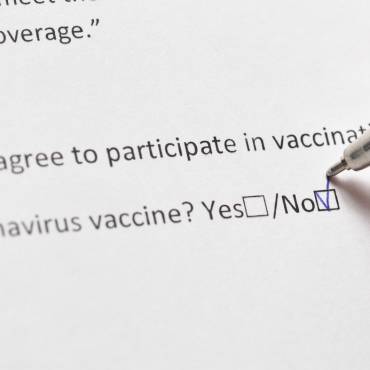An age-structured mathematical model of measles transmission in a vaccinated population is used to simulate the shift from a population whose immunity is derived from natural infection to a population whose immunity is vaccine-induced. The model incorporates waning of immunity in a population of vaccinees that eventually will become susceptible to a milder form of vaccine-modified measles with a lower transmission potential than unvaccinated classical measles. Using current estimates of duration of vaccine-derived protection, measles would not be expected to re-emerge quickly in countries with sustained high routine vaccine coverage. However, re-emergence is possible to occur several decades after introduction of high levels of vaccination. Time until re-emergence depends primarily on the contagiousness of vaccine-modified measles cases in comparison to classical measles. Interestingly, in a population with a high proportion of vaccinees, vaccine-modified measles and classical measles would occur essentially in the same age groups. Although waning of humoral immunity in vaccinees is widely observed, re-emergence of measles in highly vaccinated populations depends on parameters for which better estimates are needed.
Vaccine,
Volume 21, Issue 31, 7 November 2003, Pages 4597–4603.
Early waning of maternal measles antibodies in era of measles elimination: longitudinal study
Participants Of 221 pregnant women recruited, 207 healthy woman-infant pairs were included—divided into a vaccinated group (n=87) and naturally immune group (n=120), according to vaccination documents and history.
Main outcome measure Measles IgG antibodies measured by enzyme linked immunosorbent assay (ELISA) at seven time points (week 36 of pregnancy, birth (cord), and 1, 6, 9, and 12 months); decay of maternal antibody in infants modelled with linear mixed models.
Results Vaccinated women had significantly fewer IgG antibodies (geometric mean titre 779 (95% confidence interval 581 to 1045) mIU/ml) than did naturally immune women (2687 (2126 to 3373) mIU/ml) (P<0.001). Maternal values were highly correlated with neonatal values (r=0.93 at birth). Infants of vaccinated women had significantly lower antibody concentrations than did infants of naturally immune women (P<0.001 at all ages over the follow-up period). Presence of maternal antibodies endured for a median of 2.61 months—3.78 months for infants of naturally infected women and 0.97 months for infants of vaccinated women. At 6 months of age, more than 99% of infants of vaccinated women and 95% of infants of naturally immune women had lost maternal antibodies according to the model.
Conclusions This study describes a very early susceptibility to measles in infants of both vaccinated women and women with naturally acquired immunity. This finding is important in view of recent outbreaks and is an argument for timeliness of the first dose of a measles vaccine and vaccination of travelling or migrating children under the age of 1 year.
BMJ 2010;340:c1626

